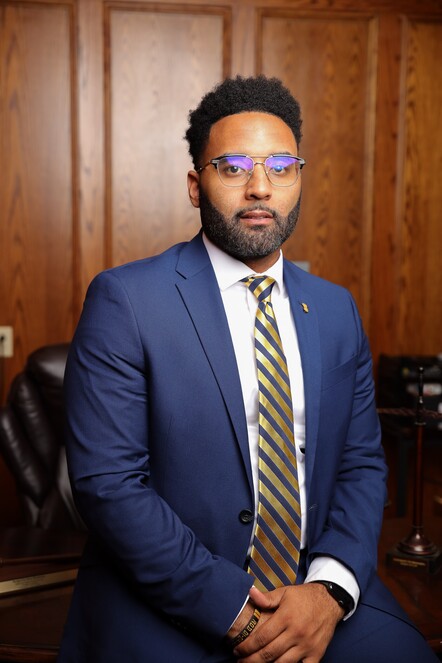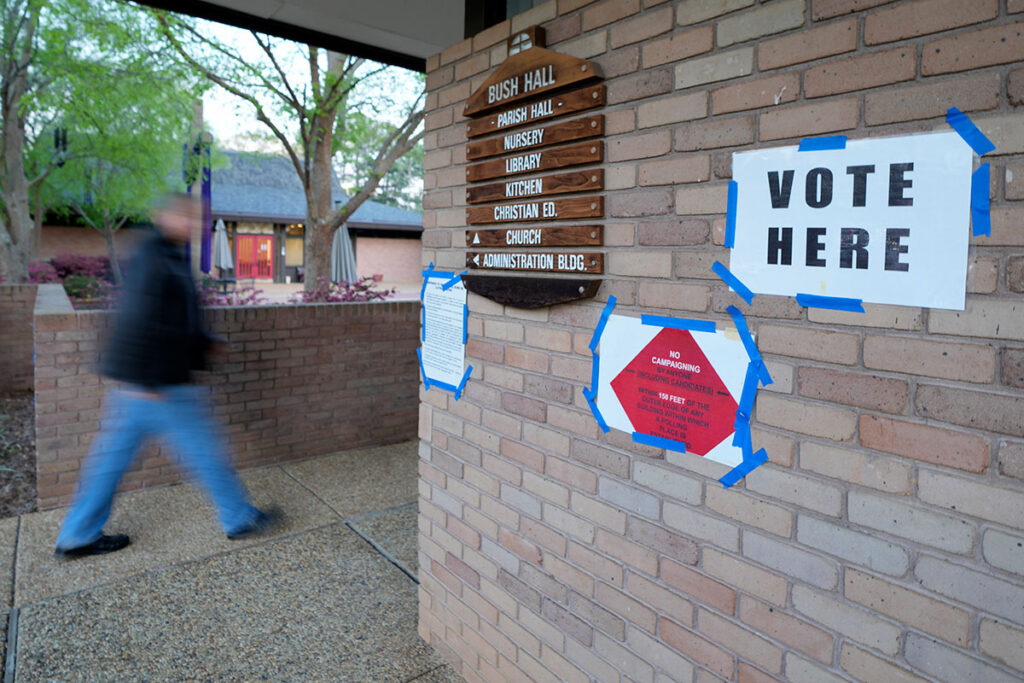Voters had no warning in August 2023 when Hinds County election officials moved two polling precincts just hours before residents were set to cast ballots in the party primaries, citing accessibility issues at the old location.
A new effort in the Mississippi House could prevent such last-minute polling-place changes. Election officials could not close voting precincts within 60 days of an election under House Bill 1156.
“You would think that that would be something that they would do by themselves, but apparently not everybody is following what seems to be common sense to me,” Rep. Noah Sanford, R-Collins, said when introducing the bill on the House floor on March 6.

If authorities find that a polling place is closed during that time period, the establishment’s supervisor must provide a valid excuse, like a natural disaster, at the next meeting with officials under the bill. It says election officials must notify citizens if a precinct will be closed within 60 days of an election by posting announcements at the polling place, city hall, the courthouse, the registrar’s office and by placing ads for three weeks in the local newspaper.
Sanford said H.B. 1156 would hopefully prevent people from going to the wrong polling place on Election Day.
“If a polling place is closed a month before the election, it may be difficult for news to get out of that, and you have people going to the wrong place on Election Day to vote,” he said. “And if they’re like me, they don’t have a lot of time, so if they go to the wrong place, they may not go to the right place and just not vote.”
The House unanimously passed H.B. 1156 on March 6. It heads to the Senate. If the Senate passes the bill without amendments, it goes to Gov. Tate Reeves’ desk.
Banning AI Images Created ‘To Cause Harm’
Creating “intimate or nonintimate” audio or graphic depictions of people using artificial intelligence or other software “with intent to cause harm to the emotional, financial or physical welfare” of another person could soon be punishable as a crime in Mississippi.
On March 6, the Mississippi Senate passed Senate Bill 2288 on March 6, which says anyone over the age of 21 who creates such audio, video or still images could serve up to five years in prison and pay up to $5,000 in fines. A person under 21 could serve up to a year in prison or pay up to a $2,500 fine.

The chamber passed the bill at a time of rising concerns about the misuse of AI, such as pornographic deepfake images of Taylor Swift that spread on social media in February. The bill’s text includes an example of what the distribution of an illegal AI image could look like.
“With intent to cause harm to the emotional, financial or physical welfare of another person, he or she intentionally disseminates or publishes an image or audio created or altered by digitization depicting such other person with one or more intimate parts exposed or engaging in sexual conduct with another person, where such person may reasonably be identified from the image or audio itself or from information displayed in connection with the image or audio,” S.B. 2288 says.
The Senate unanimously passed the bill on March 6; it goes to the House for consideration. If the House passes S.B. 2339 without amendments, it would go to Gov. Tate Reeves’ desk where he could sign it into law if he chooses to do so.
Extended Run-offs
Run-off elections could be held four weeks after the initial election instead of three weeks under House Bill 1404. Rep. Timaka James-Jones, D-Belzoni, said the election commissioners and circuit clerks of Mississippi pushed for the change as she introduced the bill.
“This does allow for the opportunity for the absentee ballots to be completed and that the process is done in the time period for certifying the election,” she said on the House floor on March 6.
The House passed the bill 116-1; Rep. Omeria Scott, D-Laurel, was the sole nay vote. H.B. 1404 heads to the Senate for consideration. If the Senate passes the bill without amending it, it will head to Gov. Reeves’ desk.
Mississippi Terroristic Threats Law
Under the Mississippi Terroristic Threats Law, a person who makes a “terroristic threat” at an airport could be subject to at least a five-year prison sentence if convicted. Senate Bill 2196 would amend Mississippi Code 97-7-75 to add the punishment for offenders.
“It is not a defense to a prosecution under this section that, at the time the defendant made the terroristic threat, the defendant did not have the intent or capability to actually commit the specified offense, nor is it a defense that the threat was not made to a person who was a subject or intended victim of the threatened act,” the bill says.
The Senate unanimously passed S.B. 2339 on March 6; it heads to the House for consideration. If the House passes the bill without any amendments, it will go to Gov. Tate Reeves’ desk where he can choose whether or not to sign it into law.
Teaching Sign Language in High School
High-school students could take American Sign Language to fulfill their foreign language requirements under a bill the Senate passed on March 6. Under Senate Bill 2339, the State Board of Education would have to create a sign-language curriculum to supply to schools.

Sen. Rod Hickman, D-Macon, said schools often offer sign language as an elective, but that those classes do not officially count toward the students’ high-school graduation credits. While American Sign Language is not technically a foreign language, it would fill the requirement anyway, he said.
“Whatever language a child or young adult might choose to become proficient in, whether that be sign language or a language from another country, it will be beneficial to their learning and their ability to communicate with other people and, hopefully, advance their education,” Sen. David Parker, R-Olive Branch, told Hickman on the House floor on March 6.
The Senate unanimously passed S.B. 2339 on March 6; it heads to the House for consideration. If the House passes the bill without any amendments, it will go to Gov. Tate Reeves’ desk where he can choose whether or not to sign it into law.
Revise Juvenile Offender Sentencing
Only a jury would be able to sentence a person under the age of 18 to a life sentence in prison under House Bill 1440, which clarifies sentencing laws for minors.
“A juvenile offender who is convicted of capital murder may be sentenced to life imprisonment or life imprisonment without eligibility for parole in the custody of the Mississippi Department of Corrections if the punishment is so fixed by the jury,” the bill says.
A judge would hold a sentencing hearing to decide how long the minor’s imprisonment should be. If the judge does not think a life sentence is appropriate, he or she could sentence a minor to serve 20 to 40 years for first-degree murder and 15 to 30 years for second-degree murder.
The House passed H.B. 1440 with a 114-3 vote on March 6. It heads to the Senate for consideration. If the Senate passes it without amendments, it will go to Gov. Tate Reeves’ desk.
Failed: Allowing Gun Possession for Nonviolent Ex-Felons
Formerly incarcerated people convicted of nonviolent felonies will not be allowed to own guns, the Mississippi Senate decided when voting against Senate Bill 2626 on March 6. The bill proposed allowing certain formerly incarcerated people to own guns five years after they finished their sentence if they paid all fines.
S.B. 2626 failed by a 23-29 vote. It will not move any further in the legislative process.
Anti-Abortion, Anti-Trans Bills Die
Two anti-abortion bills sponsored by Rep. Dan Eubanks, R-Walls, died in committee on March 5. A ban on “abortion trafficking,” which would prevent adults from taking minors out of state for an abortion without the family’s permission, did not advance out of the Judiciary B committee. A bill that would have banned mail-order abortion medications and devices died in the Public Health and Human Services Committee.

Another bill Eubanks introduced that would have forced educators to out transgender and nonbinary students to their families also died after failing to make it out of the House Education Committee.
A painting featuring two white-haired generals hoisting a Confederate flag will remain on the dome of the Mississippi Capitol rotunda after Senate Bill 2217 died in the Rules Committee on March 5.










